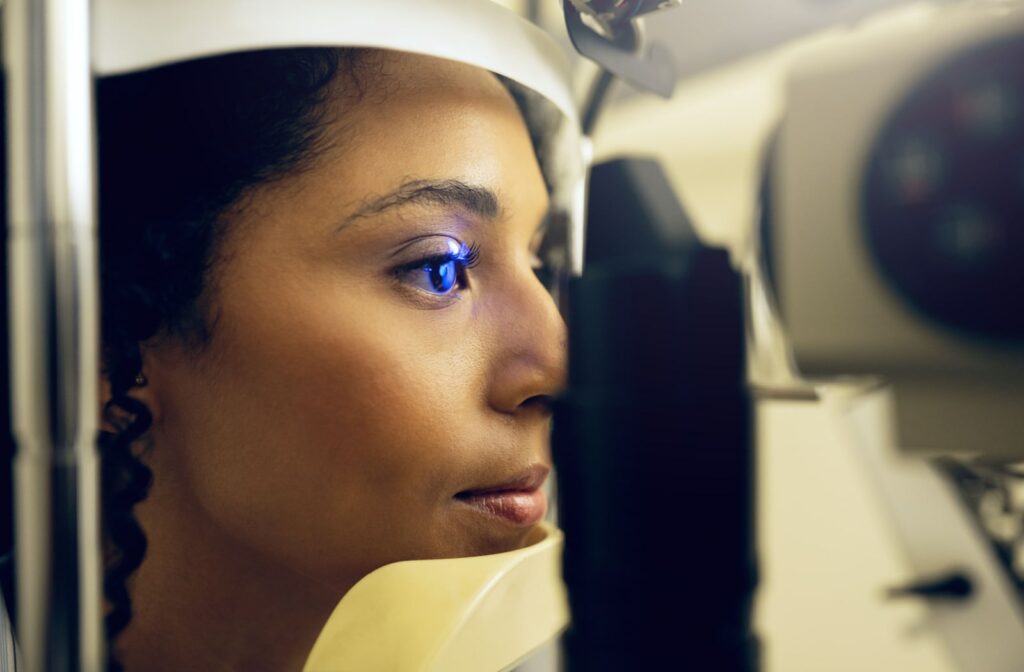While there are many concerns we may think about when considering diabetes, eye health doesn’t always top the list. Unfortunately, diabetes can affect the blood vessels in your eyes, causing damage that can lead to blindness if left unchecked.
A diabetic eye exam is a comprehensive eye exam focusing on detecting diabetic-related eye diseases. In fact, your optometrist could even be the first person to detect diabetes during such an exam. These tests are designed to pick up diabetic changes that are often asymptomatic in their early stages but, when uncovered early, can help preserve vision.
Symptoms of Diabetes
When it comes to diabetes, prevention is key. Knowing the symptoms of diabetes can save you from serious complications and even save your life.
Diabetes affects your body’s ability to control blood sugar or glucose levels. There are 2 main types of diabetes: type 1 and type 2. Type 1 diabetes is an autoimmune disease that destroys insulin-producing cells in the pancreas. Type 2 diabetes is more common and often caused by a combination of genetic and lifestyle factors, but can similarly affect how your body produces or uses insulin.
The symptoms of diabetes can vary depending on the type of diabetes you have. Type 1 diabetes symptoms typically appear suddenly, while type 2 diabetes symptoms may develop gradually over time.
Symptoms of diabetes include:
- Frequent urination
- Increased thirst
- Blurry vision
- Fatigue
- Slow-healing wounds
- Tingling or numbness in the hands or feet
- Unexplained weight loss
- Increased hunger
- Dry mouth and skin
- Yeast infections
If left untreated, diabetes can lead to serious health complications, including heart disease, stroke, kidney disease, and nerve damage.
How Does Diabetes Affect Your Eyes?
In addition to other symptoms, diabetes can affect your eyes in these ways:
- Loss of vision
- Rapid changes in prescription
- Early onset presbyopia (inability to focus on close objects)
- Cataracts
- Glaucoma
- Paralysis of eye nerves
- Retinal detachment
- Flashers and floaters
- Blurry vision
One of the main ways diabetes can damage the body is by affecting blood vessels. Since the retina at the back of the eye is full of blood vessels, this can cause issues for your vision.
Diabetic Retinopathy
Diabetic retinopathy is a progressive disease that can cause the small blood vessels in the retina to swell or leak, leading to vision loss if left untreated. The longer a person has diabetes, the more likely they are to develop diabetic retinopathy. Additionally, poorly controlled blood sugar levels, high blood pressure, and other health conditions such as high cholesterol and kidney disease can increase the risk of diabetic retinopathy.
The symptoms of diabetic retinopathy can vary depending on the stage of the disease. In the early stages, there may be no noticeable symptoms, making it important for people with diabetes to have regular eye exams. As the disease progresses, you may notice symptoms such as:
- Blurred vision
- A large number of floaters in your vision
- Shadows or missing areas of vision
- Difficulty seeing at night
- Loss of central vision
- Colours appearing faded or dull
- Vision loss
If these blood vessels leak, your retina may grow new, abnormal blood vessels. These blood vessels can be prone to damage, increasing your risk of retinal detachment.
Diabetic Macular Edema
Diabetic macular edema (DME) occurs when fluid accumulates in the macula, the part of the retina responsible for central vision. High blood sugar levels, such as those caused by diabetes, could lead to the blood vessels leaking, resulting in DME.
Long-term high blood pressure and high cholesterol can also increase the risk of developing DME. It’s considered a type of diabetic retinopathy, so it could share symptoms with the general condition, but DME is known for:
- Objects appear wavy, especially in your central vision
- Objects appear to be different sizes when looking through each eye
- Colours look washed out or faded
What Happens During a Diabetic Eye Exam?
The first step in a diabetic eye exam is typically a thorough medical history. Your optometrist may ask you about the duration and severity of your diabetes and any other health conditions you may have. They may also ask about your specific symptoms, if any, related to your eyes. This information can help your optometrist better understand your condition and tailor the exam accordingly.
After the medical history, your eye doctor can perform a visual acuity test to determine your baseline vision. This test involves reading letters on an eye chart from different distances.
Since many diabetic eye symptoms occur inside the eye, your optometrist will typically need to peer deeper for a proper diagnosis. Your optometrist may use optomap imaging or fundus photography to take detailed images of your retina.
Optomap allows us to capture more than 80% of your retina in one panoramic image, making detecting any abnormalities or changes easier over time. The optomap process is quick and can provide valuable information about your eyes’ health.
One of the most important aspects of a diabetic eye exam is the dilated eye exam. During this test, we can use eye drops to dilate your pupils, making it easier to see the inside of your eye where the damage from diabetes is most likely to occur.
Managing Diabetes Through Eyecare
A diabetic eye exam can be crucial to managing your diabetes and protecting your vision. At Advance Eye Care Center, we use our diagnostic technology to capture detailed images of your retina and blood vessels, making it easier to detect changes or damage over time.
By staying up to date on your eye exams and working with your doctor to manage your diabetes, you can minimize your risk of complications and protect your vision for years to come. Don’t let diabetes sneak up on you. Book your eye exam today!





